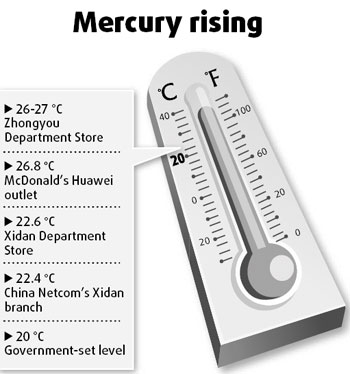

It is the coldest time of the year in Beijing, so people wear a lot of clothing to stay warm. But inside some shopping malls, restaurants and office buildings, it's very warm indeed.
At a McDonald's restaurant in Xidan, one of the busiest commercial areas in Beijing, employees wearing short-sleeved shirts have been busy serving food. Customers take off their heavy coats and down jackets, enjoying their cold cola and ice cream.
"I feel like it's summertime," says one customer in his 20s. "I always come here to escape from Beijing's severe winter."
Last week, the Global Village of Beijing, a non-governmental organization, tested the air temperature in the fast-food restaurant.
"It has surpassed the national standard by nearly 7 Centigrade," says Cui Xiaoxian, campaign officer for the organization.
The findings are part of Global Village's campaign to determine how many public buildings have set their temperatures higher than 20 oC, a national standard set by the State Council to save energy.
While checking and testing the sites, campaigners also ask operators of facilities to sign a letter promising to adjust the heat to an appropriate level.
After testing facilities ranging from shopping malls, restaurants to office buildings and hotels, the NGO found that most heating units are set at temperatures ranging from 22 to 26 oC, while some are set even higher.
The temperature in Xidan Department Store was measured at 22.6 oC, while Zhongyou Department Store exceeded the standard by 6 to 7 oC. Both stores signed a letter of commitment, promising to discuss it and reply.
Others tested included McDonald's Huawei outlet that was recorded at 26.8 oC - with some customers saying it was too hot - and China Netcom's Xidan branch that was 2.4 oC higher than the set level.
Workers at both said they are not responsible for the setting the temperature, noting it's the responsibility of property management companies.
"Relatively high settings consume unnecessarily high amounts of electricity while creating discomfort," says Cui.

Setting an air conditioner temperature 1 oC higher in summer can save 5 to 8 percent of electricity, according to studies, while in winter, 10 percent can be cut by setting the temperature 2 oC lower.
"Small steps can make a big difference. All enterprises should take the responsibility of saving energy and protecting the environment," Cui says.
The Global Village of Beijing has asked about 20 companies to sign its letter of commitment.
"We are expecting more enterprises to join in the green efforts," Cui adds.
Xidan District is the first step in the temperature measurement move as volunteers of the Global Village of Beijing plan to visit Financial Street, the International Trade Center, Wangfujing and others.
Cui says the figures collected are sent to a Beijing energy saving supervision team. After they are checked, official figures are scheduled to be released at the end of this month.
26 C summer campaign
The temperature of all China's air-conditioned public places should be kept at no lower than 26 oC in summer, according to the State Council's circular published in June 2007.
The circular was sent to all central and local government bodies in an effort to save China's limited energy resources and brace for the upcoming electricity demand peak in summer.
According to the notice all government agencies, associations, groups, companies and private owners of buildings should "strictly comply with this rule".
It also bans the sale of air conditioners with low energy efficiency and encourages users to make technical changes to air conditioners to save energy.
(China Daily 01/05/2008 page4)













